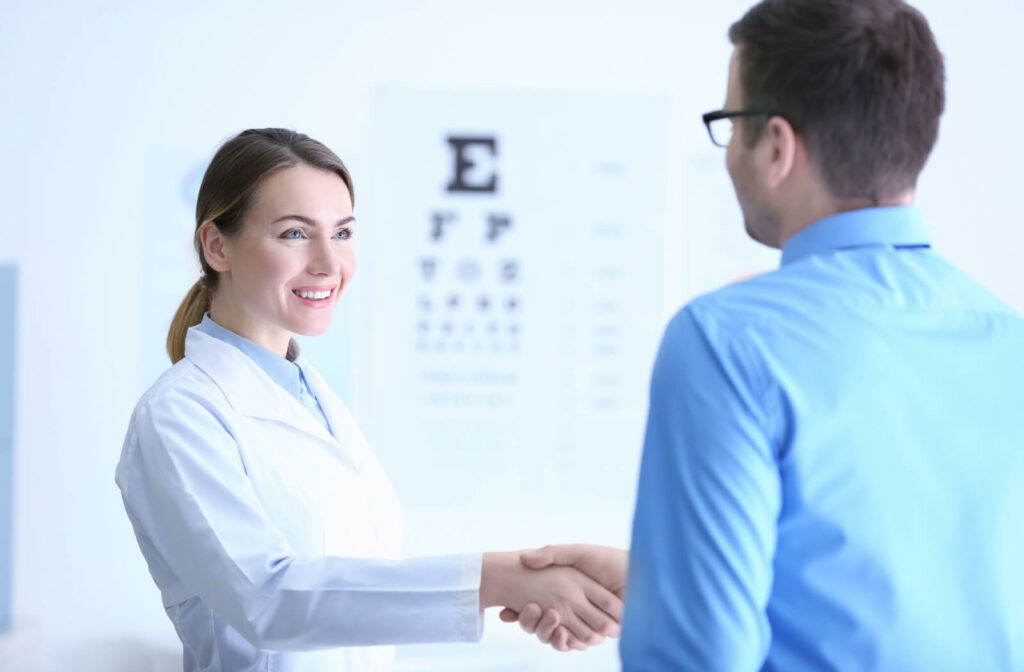Visiting your eye doctor involves meeting with several professionals. Your eye doctor handles your eye exam, assessing your vision. Afterward, they send you to their optician, who works to find glasses that meet your needs.
If you’re experiencing a significant issue, you may hear your doctor mention a referral to an ophthalmologist.
The Differences Between Opticians, Optometrists, & Ophthalmologists
If you read about eye care, you’ll likely hear many different terms and titles, including opticians, optometrists, ophthalmologists, and eye doctors. These titles can be confusing if you’re unfamiliar with the industry.
While opticians, optometrists, and ophthalmologists all work to provide quality eye care, they have different skills, education, and purpose when it comes to your eyes.
The differences between these titles are as follows:
- Opticians: Technicians trained to help fit patients with glasses, fill eyeglass prescriptions, and adjust glasses frames and lenses when needed.
- Optometrists: Doctors focusing on primary vision care, such as examining, diagnosing, and caring for eyes in an eye exam, treating common eye-related problems, and prescribing glasses and contact lenses. Optometrists complete four years of undergraduate studies followed by four years of graduate studies for a Doctor of Optometry degree.
- Ophthalmologists: Doctors specialized in eye care who typically focus on treatment and surgery over primary services like optometrists. Ophthalmologists complete four years of undergraduate studies, followed by four years of graduate studies for a Doctor of Medicine degree, and then a specialized residency program in ophthalmology.
Another common term in eye care is “eye doctor,” which is an optometrist or ophthalmologist. It’s a more casual term that many patients use.
What Does an Optician Do?
Opticians require less education (1–2 year program) than an optometrist or ophthalmologist, but they have an essential role in every office. Opticians handle the customer service aspects of eye care, working near the front of an optometrist’s office or optical shop.
Many opticians have years of experience in eye care but cannot examine your eyes, diagnose problems, or treat eye issues like a formal doctor. However, they can answer general eye care questions or refer you to your eye doctor for answers.
An optician has many responsibilities, including:
- Handling general office duties
- Filling eye prescriptions sent to them from your eye doctor
- Assisting with choosing the right frames, lenses, and other vision accessories for your needs
- Measuring, fitting, and adjusting frames
- Assisting with various machines used in eye exams
What Does an Optometrist Do?
An optometrist is the eye doctor patients commonly see—visiting them should be a regular part of managing your health. They help protect your eye health and vision by examining your eyes for problems, diagnosing eye conditions, and treating identified issues.
It’s important to acknowledge that optometrists are primary vision care providers—they are not typically specialists who perform surgeries. Your optometrist can help diagnose a significant eye problem, but it may not be in their scope of practice to treat it. In these cases, your eye doctor will refer you to an ophthalmologist to handle treatment.
An optometrist’s responsibilities include:
- Administering regular eye exams
- Prescribing glasses, contact lenses, and medications
- Diagnosing eye conditions
- Treating eye conditions
- Assisting with pre and/or post-operative care
What Happens During Your Eye Exam?
Eye exams are essential for your vision and eye health—your eye doctor takes a comprehensive look at your eyes and sight to identify potential problems. You should ideally visit your eye doctor every 1–2 years unless directed otherwise by them.
Your eye exam has several steps, including:
- Patient history: You and your eye doctor will discuss your lifestyle, family history, and medical history to learn about any possible vision risks.
- Visual acuity: Your eye doctor will assess your visual acuity to determine if you need corrective lenses and identify how strong of a prescription you need.
- Preliminary tests: Your eye doctor will assess several aspects of your vision, including peripheral vision, depth perception, and color vision.
- Eye health evaluation: Your eye doctor will look at the eye’s internal structures to help diagnose eye disease as early as possible.
What Does an Ophthalmologist Do?
While ophthalmologists can complete eye exams and other tasks optometrists can, they typically focus on specialized surgeries they’re trained for.
Ophthalmologists receive extensive training to be able to perform surgery to treat eye diseases. You’re most likely to visit an ophthalmologist if you have an eye disease or receive a referral for laser eye surgery.
An ophthalmologist has the following responsibilities:
- Providing medical and surgical treatment for eye diseases
- Offering standard optometry services
- Helping patients recover after surgery
Who Should You See?
When it comes to your regular eye care, you can see an optometrist or ophthalmologist. While they have different education levels, both can help care for your eye health and vision.
It’s most important to find an eye doctor who cares for your comprehensive eye health and makes you feel comfortable.

Schedule Your Next Eye Exam
Opticians, optometrists, and ophthalmologists are essential for quality eye care, helping protect your eye health and vision. Whether you visit an optometrist or ophthalmologist—ensure you book regular eye exams.
The Eye Avenue team is here in Oviedo for your vision. Contact us when it’s time for your next eye exam.




